Farmers Only Grow Enough Food to Support Them and Their Families
The rate at which the land is losing farmers is a cause for business. If it continues, Republic of indonesia is likely to have no farmers left in l years. What will we swallow?
"Well, nosotros will be hungry," said Adang Parman, 58, a farmer from Ciburial village in West Java. Every twenty-four hours, the father of three heads out to the field at the break of dawn to pull out weeds, water his plants or pluck vegetables from his rows of plants. His sons, meanwhile, plow the land with a handheld walking tractor.
Adang has been working in the fields for more 40 years. The work is demanding and laborious. This probably explains why fewer and fewer people are taking up the profession.
The country lost v.1 million farmers between 2003 and 2013, with their numbers falling to 26 million, according to Statistics Republic of indonesia (BPS). The trend is expected to go on in the adjacent few years. At this charge per unit, Indonesia would lose all its farmers by 2063.
"A large proportion of young people view agricultural work every bit low-wage, manual labor that is more suited to those from poor backgrounds who take limited education," a 2016 SMERU Research Plant report reads.
Agriculture is a huge contributor to Republic of indonesia's economy. Effectually 29 percent of the Indonesian workforce works in the agriculture, fisheries and livestock sector, which contributes about 13 percentage to the state's GDP. It is the tertiary-biggest contributor to the economy after manufacturing and trade, according to Statistics Indonesia (BPS) information.
Fewer immature people are pursuing farming as a profession compared with previous generations. Merely 23 percent of the country'due south xiv.2 million people aged between 15 and 24 worked in the agriculture, forestry and fishery sectors in 2019, data from the National Labor Force Survey showed.
Asep, Tisna, Dika – Adang'southward iii sons – represent the minority of young people venturing into agriculture, following in their begetter's footsteps.
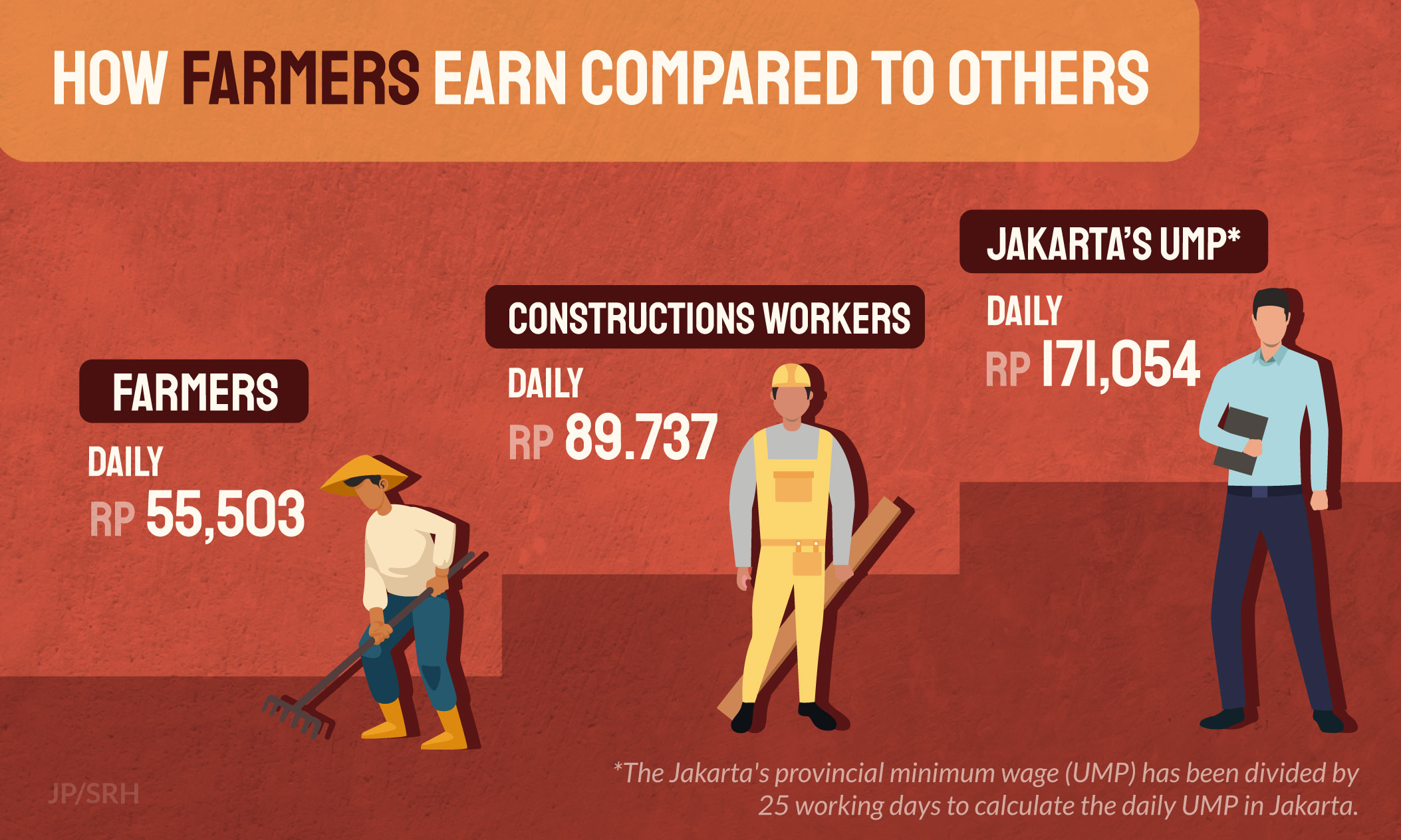
With a population of just 12,000 — less than a quarter the capacity of a major football stadium — Ciburial offers vast expanses of lush, fertile land, perfect for farming. This is not the example elsewhere in Indonesia.
Between 2013 and 2019, Indonesia's agricultural state decreased to 7.46 million hectares from vii.75 meg ha, according to information collected past the Agrarian and Spatial Planning Ministry, BPS and several other regime institutions.
Problems similar increasing production costs, changes in weather and pest attacks have besides pushed farmers to change professions, with land owners either converting country to other uses or selling it, the SMERU report states.
And then, what went wrong? How can we back up more farmers similar Adang and his family unit? The Djakarta Mail spoke to farmers, agriculture and food companies, policymakers and experts on the challenges and opportunities for Indonesia's farmers and the agronomics sector.


Future of farming depends on investment
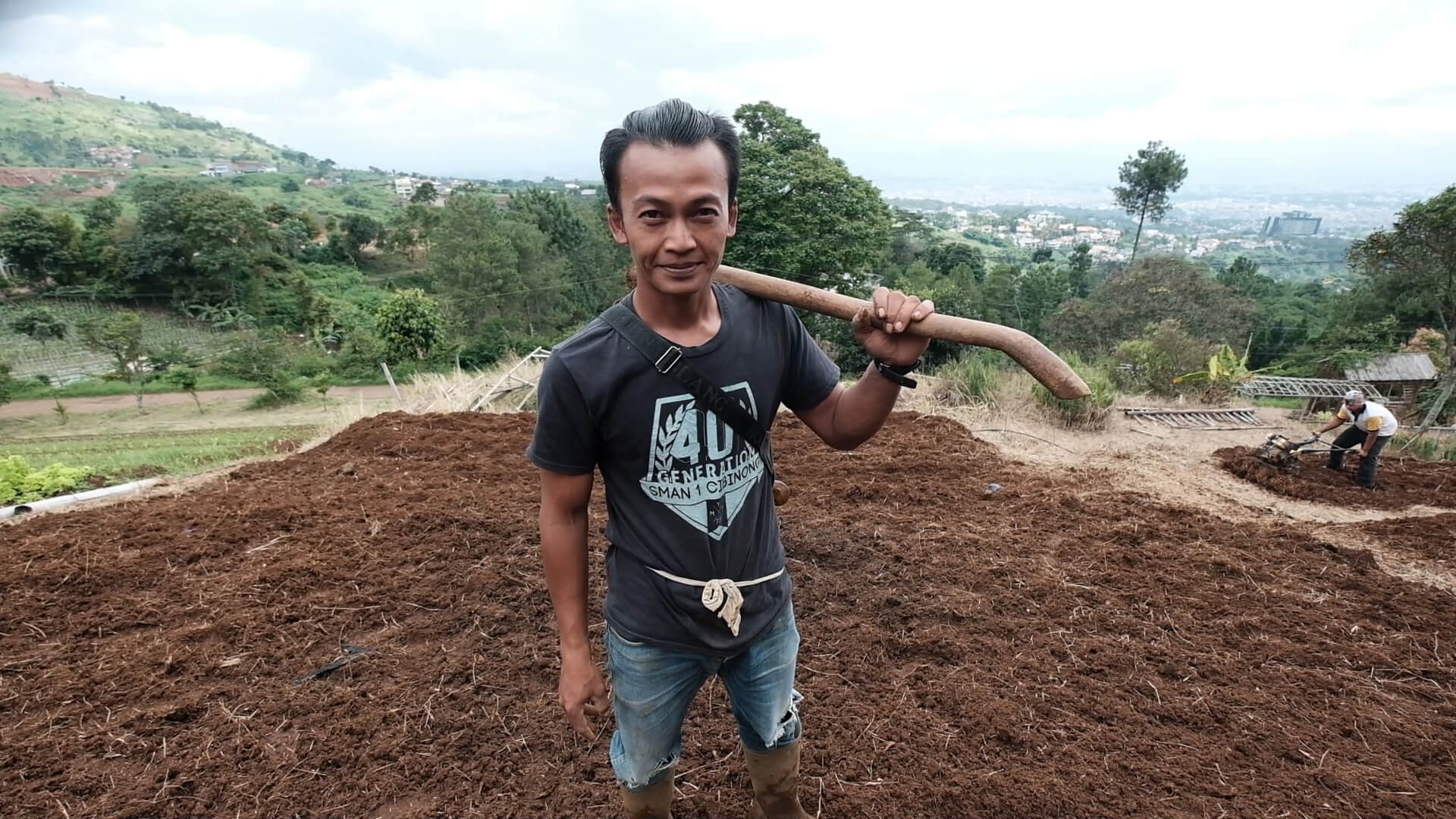
Tisna Rohmat, 33 years former, spoke of his vision for the future of farming during The Jakarta Post'due south visit to his family farm in Ciwidey, West Java. Seeing this family of passionate farmers, while rare, shed light on what could exist the time to come of Indonesia's agriculture sector, if Tisna's peers followed his lead.
"If you lot want more young people to subcontract, you must show them our success stories, surely people will come around, and they will learn what farming is similar. So nosotros accept to bear witness farming to young people and invite young people to share and have a chat," said Tisna, beaming with promise.
"At that place is no job where you tin exert as much try as farming. In farming, the potential is limitless. It all depends on what our capabilities are and how we use our intelligence."
Simply for all Tisna's passion, he needs support. Investment in agriculture must come from individuals, the private sector to the government and NGOs, people involved in the sector say. In a nutshell, it takes a village to sow the seeds for the future of agriculture.
"Increased investment in agronomics to modernize nutrient systems and markets and brand them more than efficient is key to breaking this vicious cycle," the Asian Evolution Depository financial institution (ADB) wrote in its 2019 report Policies to support investment requirements of Republic of indonesia's food and agronomics development during 2020-2045.
"Such investments will not simply help improve the country'south food production but will also enable households to engage in more productive sectors and earn better incomes."
Infrastructure investments in rural roads, electricity, cell telephone towers, markets, cold bondage and processing facilities should be expanded in partnership with the private sector, the crucial element to this attempt, the report states.
The government'due south increased investment in expanding irrigation and improving existing systems will increase crop yields and expanse, while promoting the adoption of avant-garde technologies, it adds.
Technology to pause down barriers, reshape agronomics
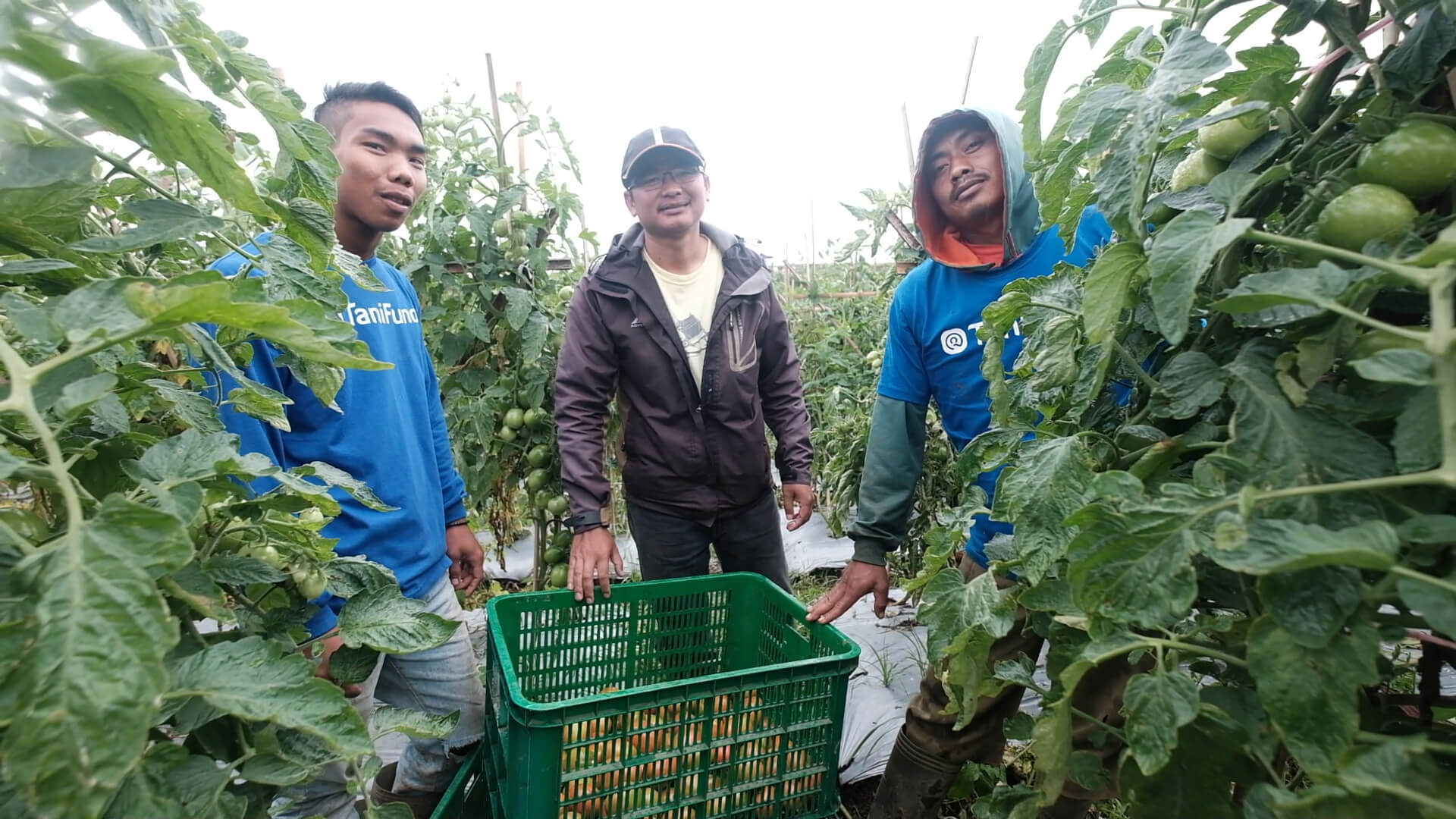
Some technology-based companies are bridging the yawning gap between farmers and consumers. The likes of TaniHub and Sayurbox allow consumers to purchase fresh produce directly from farmers.
Beyond that, TaniHub's peer-to-peer lending arm TaniFund allows individuals to lend money to farmers and so they tin have a source of funds to expand their operations. TaniFund has channeled Rp 82 billion in loans to 1,500 borrowers since its founding in 2017.
Cahyono Kurnia, a 36 years quondam farmer from Ciwidey, West Coffee, is a TaniFund borrower who decided to focus on tomato farming to improve his yields. In his 16 years in farming, Cahyono has tried beans, potatoes, bound onions, cabbages — you name information technology.
At present with i hectare of state of his own and some other hectare he rents, he feels more confident about his produce, besides thanks to TaniHub's tutor system that allows its field specialists to monitor farmers' progress.
"Earlier TaniFund was bachelor, I was hesitant to sell my harvests. I had doubts, equally I wasn't able to approximate my earnings from my crops because prices were unclear. At present, prices accept been stable, and I can earn money from skilful prices," said Cahyono, a father of two.
Agricultural technology startup Habibi Garden principal executive officer, Irsan Rajamin, said the utilization of internet of things (IoT) engineering could exist a magnet for millennials and youth to bring them into the agronomics manufacture.
"Millennials cannot take their eyes off of their phones, even for but an hour, then nosotros just accept to make their habits more productive," he said.
Habibi Garden uses digital platforms and IoT to help farmers. By connecting sensors and irrigation systems in farms to the net and providing information based on machine learning, Habibi Garden can assistance farmers monitor and maintain their farms and crops remotely.
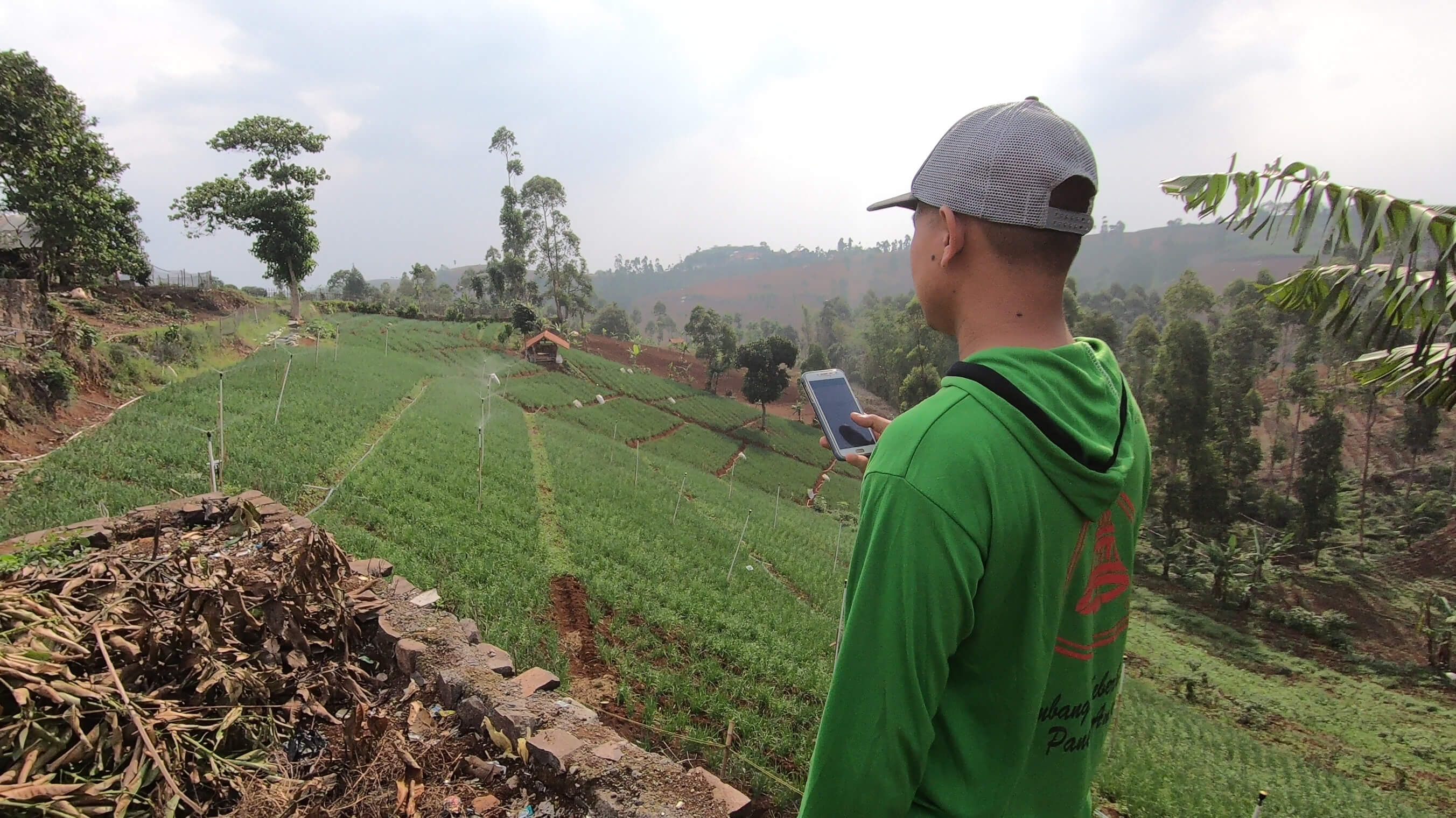
Meanwhile, the Indonesia Japan Horticulture Public-Private Partnership Project (IJHOP4) uses blockchain engineering to connect farmers with loans and insurance.
In partnership with data exchange platform HARA and local lender BTPN, the authorities-to-regime initiative aims to better farmers' financial access and cultivation techniques, optimize local supply bondage and facilitate links with modern markets.
"If demands can be met, it volition better the social and economical conditions of thousands of farmers," said Setia Irawan, the CEO of farmers' cooperative-cum-Islamic boarding school Al Ittifaq, a beneficiary of the Indonesia-Japan partnership.
Demand for the Japanese kuroda carrot variety alone from Al Ittifaq can reach five tons per week throughout the twelvemonth.
Al Ittifaq empowers Islamic boarding school students to cultivate dozens of agricultural product types on its 14 hectares of state in Ciwidey, Westward Java, an expanse famous for its ecotourism that is 2 hours' bulldoze from Bandung city center.
'Extraordinary challenge' simply hopes high: Authorities
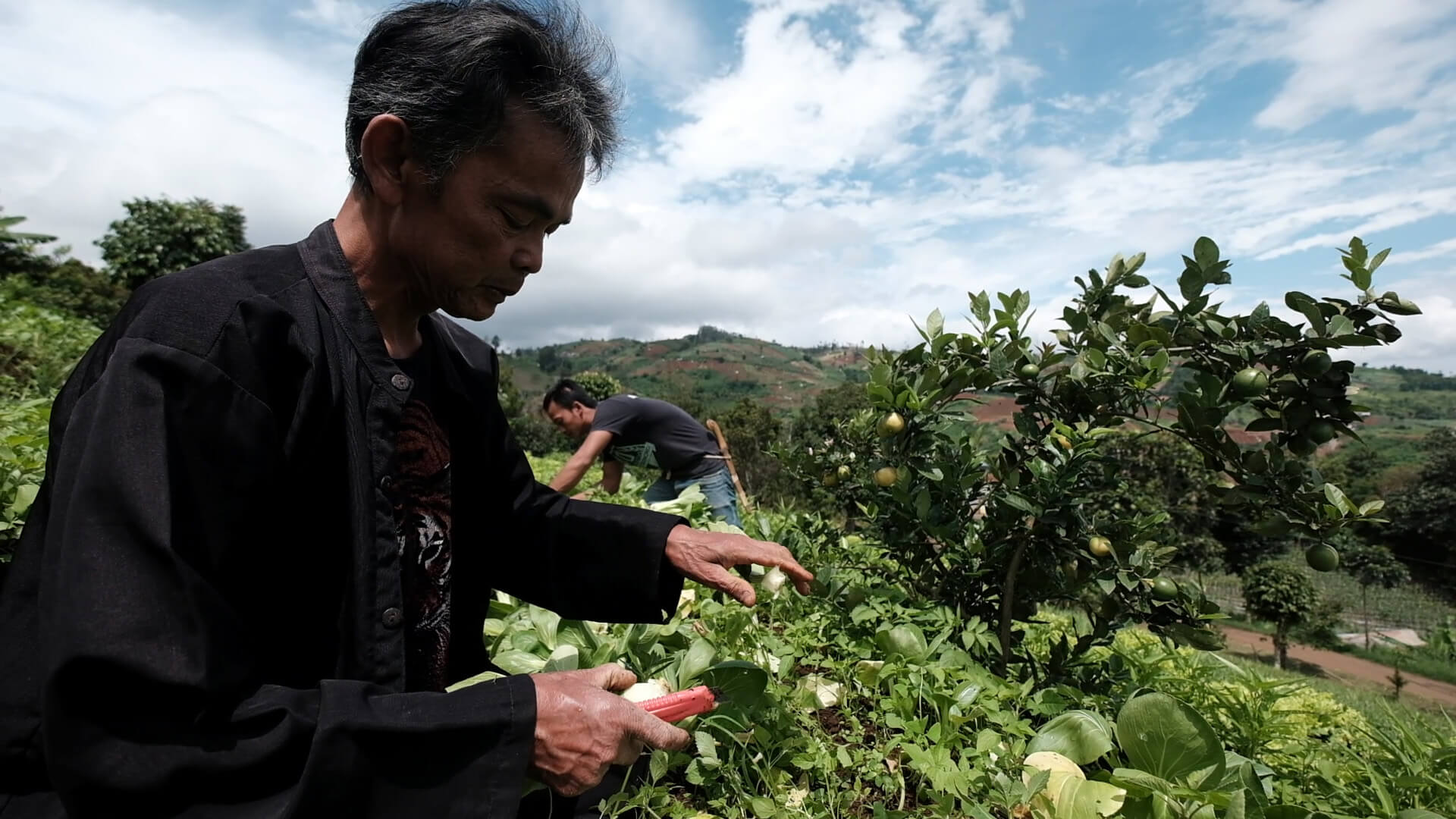
Agriculture Government minister Syahrul Yasin Limpo knows well that encouraging young people tin can exist an "extraordinary claiming". But the NasDem party politician has pledged to back up immature farmers by expanding admission to innovations and funding schemes.
In its COVID-19 response, Rp 1.85 trillion from the Agriculture Ministry building's Rp 14.06 trillion budget for 2020 has been reallocated for seed aid, labor-intensive programs, stabilization of food stocks and prices too every bit food distribution and transportation.
The minister said the ministry would continue to develop district-based agronomical counseling centers under the Kostratani scheme to better reply to the needs of farmers, in addition to providing microloans to farmers and seeking to triple agricultural exports.
"I am optimistic that the agriculture sector will thrive and young people today will seize the opportunity. They are a generation that is expert at capturing opportunities," said the minister, a old governor of South Sulawesi.
- Managing Editor
Evi Mariani
- Deputy Managing Editor
Esther Samboh
- Reporter
Made Anthony Iswara
- Contributor
Arya Dipa
- Multimedia Desk
Bayu Widhiatmoko
Yuliasri Perdani
I Gede Dharma JS
Donny Fernando
Ahmad Zamzami
Rian Irawan
Wienda Parwitasari
Oki Maulana
- UI/UX Designer
Sandy Riady Hasan
Kevin Setiawan
- Applied science
Adri Putranto
Mustopa
Akbar Alfattah
Declaricho


martinezsherecomare.blogspot.com
Source: https://www.thejakartapost.com/longform/2020/08/13/a-land-without-farmers-indonesias-agricultural-conundrum.html
0 Response to "Farmers Only Grow Enough Food to Support Them and Their Families"
Post a Comment